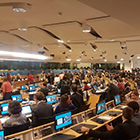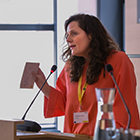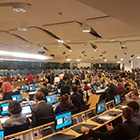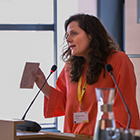International expansion
and upscaling
Real change will only be achieved if the Agreement is emulated internationally and companies around the world shoulder their responsibility for human rights, animal welfare, and the environment.
The Dutch garment and textile market makes up only 1 per cent of the world market. Real change will only be achieved if the Agreement is emulated internationally and companies around the world shoulder their responsibility for human rights, animal welfare, and the environment.
For this reason, the signatories to the Dutch Agreement on Sustainable Garments and Textile are making efforts to raise the profile of the Agreement in the European Union. For big, multinational garment brands, it is of crucial importance for there to be a single, uniform approach at the European level, so that they do not have to sign up separately in each country.
Cooperation with a German initiative
The Dutch Agreement has found a German ally. In January 2018, the cooperation agreement with the German Partnership for Sustainable Textiles was signed. Both initiatives want to support companies in conducting due diligence and setting up joint projects, as well as exerting greater influence together. Companies that have signed up to the Dutch Agreement can join the German Partnership under straightforward conditions, and vice versa.
Exerting influence together
Where possible, the Agreement exerts its influence to bring change to the sector. One example is the letter sent in November to the Prime Minister of Bangladesh. In the letter, the parties to the Agreement, together with a large number of multi-stakeholder initiatives, called on the Prime Minister not to end the Bangladesh Accord before the government has sufficient capacity to carry out inspections of factories and other companies itself. This is necessary so as not to risk frustrating the progress of safety in Bangladesh’s garment industry. The Agreement had previously sent a letter to Bangladesh in July to voice encouragement for an increase in the minimum wage for garment workers.
Support in the Netherlands
In 2018, the Agreement organised a number of working visits for members of the House of Representatives and the Minister of Foreign Trade and Development Cooperation. Among other things, the members of the House of Representatives visited HEMA to learn more about agreements in the area of IRBC. Kings of Indigo and WE Fashion were also present during the visit. Minister Sigrid Kaag made a visit to Zeeman to see how this party to the Agreement works on sustainability.
Germany and the Netherlands on a mission in Europe

Expansion to other member states, while at the same time scaling up to the European level. That is the joint aim of the Dutch Agreement and the German Partnership. In June, they organised a meeting in Brussels to promote their approach. It was the start of a European Roadshow.
The Dutch and German initiatives for a sustainable garment and textile sector are working together closely. According to Jos Huber, policy adviser of the Ministry of Foreign Affairs, they want to put the subject of IRBC high on the European agenda.
‘In June, we launched a roadshow together with the German Partnership to inspire other member states to start similar multi-stakeholder initiatives. In Spain, similar efforts are now underway and that is an important step. In the next step, we would also like to reach the East European member states. We talk a lot about Asia, but the garment industry in Europe should also meet the sustainability standards. There is quite a bit of work still to be done on that point, too.’
If other member states can be motivated to start national initiatives, it will be easier for the European Commission to arrive at a European approach. Huber: ‘That is exactly our strategy. National initiatives are needed to address the whole garment and textile sector, thus also including SMEs. At the same time, we need a European approach to get the international retail chains and fashion brands on our side. The two movements are needed at the same time in order to arrive at an internally coordinated approach by the European Commission.’
The role of Europe was also on the agenda at a conference organised by the Dutch Ministry of Foreign Affairs in Brussels in October 2018, in cooperation with the Social and Economic Council of the Netherlands (SER) and the European Economic and Social Committee (EESC). The conference looked at the role of initiatives for sustainable international value chains in relation to the Sustainable Development Goals (SDGs). This concerned, among other things, sustainability within the garment and textile industry and the role that Europe can play.
Femke den Hartog, policy adviser at non-food retail trade association INretail:

She chairs the working group that is striving to achieve more affiliations, more signatories, and more support for the Agreement. Femke den Hartog, policy adviser at INretail, is often in talks with multinationals on the subject.
‘Over the past year, quite a number of Dutch brands and retailers have signed up to the Agreement. Unfortunately, the big multinationals, such as H&M, Inditex and Primark, are still underrepresented.
This not because they reject the Agreement – on the contrary, they emphasise its importance. They are happy to take part in projects undertaken on the basis of the Agreement, such as the living wage, and they are also very willing to share their expertise. However, they are reluctant to sign all kinds of national initiatives, including the Dutch Agreement. The reason is that they come up against practical limitations with regard to meeting the various different requirements set under the initiatives.
That is a great pity. That said, the Agreement is a means, not an end. The aim is for the problems in the sector to be tackled worldwide. This starts with national initiatives, but an initiative at the European level is indispensable. Therefore, we’re calling on the European Commission to set this in motion, particularly in view of the multinationals that would like to see a European initiative. We’re also considering which international initiatives the Dutch Agreement could work with well, such as the German Partnership for Sustainable Textiles and the Sustainable Apparel Coalition (SAC).
The sector is facing a major transition. Garments and textiles not only have to become sustainable, but also circular, that is to say ‘cradle to cradle’. A level playing field is of great importance for the whole sector. The transition cannot remain limited to companies that participate voluntarily. Ultimately, all companies in the sector will have to make a contribution. This will become increasingly important in the years to come.’
Cooperation and alignment
‘As a national initiative, we have been striving for cooperation and alignment with other initiatives, to achieve impact, minimise double work and be attractive to members. Our cooperation with the Dutch Agreement for Sustainable Garments and Textile evolved a great deal in 2018. We exchanged tools, organised joint workshops and events, achieved alignment across a variety of topics, and welcomed the first joint memberships of companies. We aspire to go further in 2019, making our cooperation a cornerstone for sustainable and responsible business conduct in Europe.’
Juergen Janssen, coordinator Bündnis für nachhaltige Textilien[Partnership for Sustainable Textiles]

